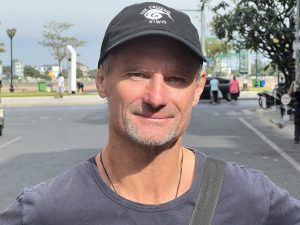Cambodia’s Khmer Rouge tribunal is all but over. The final appeal in the genocide case against the regime’s former head of state Khieu Samphan has been dismissed and legislation passed to wind up the legalities and consign volumes of evidence to the history books.
For many of Pol Pot’s victims, the time has come to move on – and that includes Rob Hamill, a New Zealander who testified against Kaing Guek Eav, or Duch, who ran the S-21 extermination center and was responsible for the death of his brother Kerry.
Kerry Hamill was sailing around the world and is thought to have drifted into Cambodian waters with John Dewhirst and Canadian friend Stuart Glass during the Democratic Kampuchea era.
Glass was shot and killed when the boat was seized. But Hamill and Dewhirst were captured and held by the Khmer Rouge naval commander Meas Muth, who then transferred the pair to S-21 in Phnom Penh where they were processed and executed in 1978.
Despite the many criticisms leveled at the Extraordinary Chambers in the Courts of Cambodia (ECCC), as the tribunal is officially known, Rob Hamill is happy with the outcomes of the tribunal which he says has laid Khmer Rouge atrocities bare and given ordinary Cambodians the right to speak and judge their past.
That includes a life sentence meted out to Duch who died behind bars in September 2020.
His one disappointment was the ECCC’s inability to put Meas Muth, now 84, on trial after he was accused by international prosecutors of causing at least 7,400 deaths between 1975 and 1979, when some two million people perished under Khmer Rouge rule.
A former Olympic rower and political candidate, Rob Hamill is currently emulating his brother’s dream and sailing around the world with his family in tow.
He recently landed in Cambodia, where he spoke with The Diplomat’s Luke Hunt about the loss of Kerry, the impact that had on his family, and staring down Comrade Duch.
Footnote: This podcast was recorded shortly after the passing of Nate Thayer, the last journalist to interview the Khmer Rouge leader Pol Pot in 1997.

































